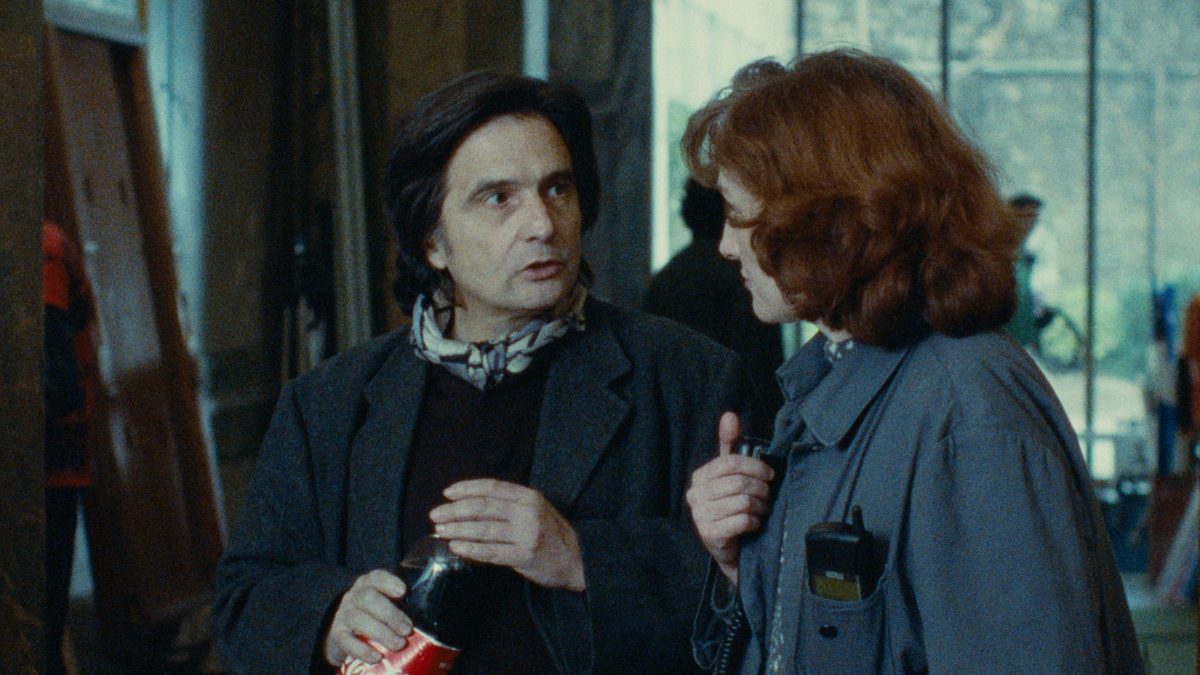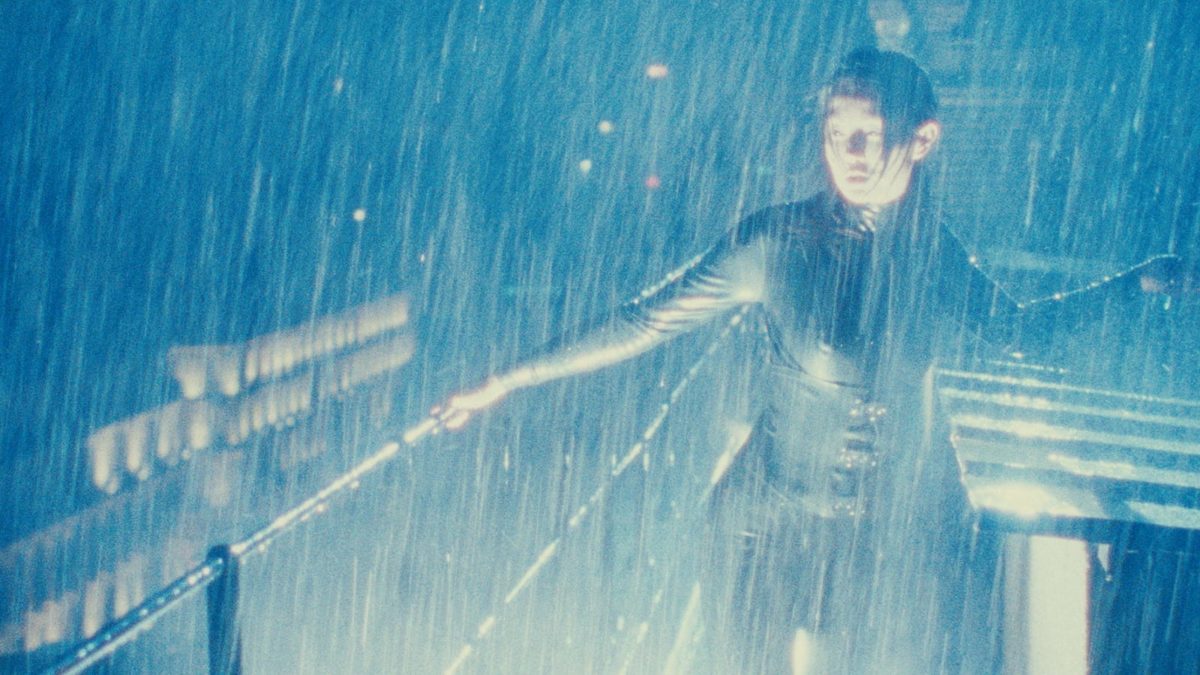In the quarter-century since its debut, Olivier Assayas’ hilarious, mischievous, altogether unclassifiable Irma Vep stands merrily uninterested in many things contemporary movies are meant to be interested in—not ultra-sophisticated narrative gimmickry nor obsequious adherence to genre constraints nor even universality, the ability to speak at once to the interests and experiences of all audience members. Cinephiles, a group left ravenous this past year for very obvious reasons, remains the ideal and intended viewers for Irma Vep, which is being released by the Criterion Collection in a new, director-approved 2k digital restoration made from the original camera negative.
Irma Vep still has something of importance to say to those, like its writer-director, who care deeply about the movies and want to, perhaps, radically reorganize the priorities of the form by bringing its maddening contradictions to the fore. Assayas doesn’t offer any easy fixes to the troubles afflicting cinema circa 1996, which aren’t drastically different from the troubles afflicting cinema in 2021 and are cataloged with such humor and elegance. Instead Assayas practices a form of discursive iconoclasm—if not outright attacking cherished idols and beliefs of French cinema, past and present, then at least casually taking them down a peg or two.
This goal finds its cheekiest personification in the form of actress Bulle Ogier, a mainstay of European cinema who has worked for the likes of Luis Buñuel, Jacques Rivette, and her husband Barbet Schroeder. Cast here as a dinner hostess with some indeterminate connection the film industry, the perky, purring Ogier proves more interested in deciphering the sexual proclivities of visibly uncomfortable leading lady Maggie Cheung (playing a version of herself) than discussing the silent classics of Louis Feuillade, a filmmaker she claims makes her grateful for the fast-forward button on her VCR remote.
Feuillade’s seminal, early-20th-century serial Les vampires, centered on the exploits of the flamboyant vampiress Irma Vep, haunts and hangs over Assayas’ film. It’s the work that disgraced director René Vidal (Jean-Pierre Léaud) attempts (and ultimately fails) to remake with the Hong Kong-born, British-schooled Cheung, an atypical choice for a canonically French character. But René’s own investment in the material is dubious at best: like so many directors of today’s middling superhero nonsense, he has an established star and intellectual property but no guiding personal vision, no fundamental reason for the film’s existence.

Later, José Mirano––a bullish director played by Lou Castel––enters the picture to replace René when the latter suffers a nervous breakdown. (Note here how expendable and replaceable the position of director has already become to a production, a testament to the idea, enshrined these days by Kevin Feige and his Marvel machine, that contemporary movies are more produced than directed.) It doesn’t take long for José to assume the mantle of French cine-nationalist, railing with barely veiled racism against the casting of an Asian actress as Irma Vep, a Gallic cinema icon whose sanctity must be upheld. In the ultimate irony, Assayas allows us to glimpse José watching a VHS tape of Les Vampires at home, only to discover that the dirtbag is sleeping through the film.
That this character is played by a Colombia-born Swede who rose to fame in Italian-made productions that often reflected his militant leftist views is one of many meta-ironies in Assayas’ casting, which itself caters to cinephiles with a comprehensive knowledge of the long and short histories of these actors. Cheung and Léaud each bring their own star texts, deepening the meanings of Assayas’ film with those well-acquainted with their careers. Léaud, a bastion of the French New Wave and a familiar face to even the most casual of repertory cinema attendees, is mercilessly asked to signify the demise of a certain kind of cerebral French filmmaking. There is an undeniable poignancy in seeing The 400 Blows’ frozen boy on the beach grow up to become a foggy, jaundiced director who has misplaced both his mind and talent.
Cheung, Assayas’ ex-wife and one of the most watchable people on the planet, is painted far more flatteringly as a smiling, human symbol of cinema’s increased globalization. This trend provokes a certain cynicism in Assayas and is evinced throughout Irma Vep, but is nowhere to be found in Cheung’s lithe, naturalistic performance as the open-minded Maggie that exists here. She proves herself early on as a game collaborator to her director, costars, and besotted costume designer, Zoé, played with such aching, self-deprecating ardor by the undersung Nathalie Richard, whose emotionally resonant performance is one of many smaller sketches woven into the sprawling tapestry of Irma Vep and whose final scene is a quiet heartbreaker of abruptly dashed hope.
Maggie, the object of both Zoé’s unreciprocated affection and René’s unachievable vision, importantly establishes herself as an ardent defender of different forms of cinema, especially when confronted, in a key scene, with the hectoring condescension of a visiting journalist who only wants to talk about Cheung’s countryman John Woo. Later, when this same reporter asks her, “You don’t think the intellectual film killed cinema?” Maggie insists on sticking up for René’s unpopular form of cerebral artistry. She possesses her own opinions about the state of movies, voicing a particular aversion to the ugly excesses of American blockbusters while nonetheless defending their right to exist. (She also has her own secrets, suggested by a heady and indelible sequence in which Maggie, clad neck-to-knee in Irma’s black latex suit and growing restless in her hotel room on a rainy night, proceeds to swipe a necklace from the room of a fellow female guest, all set to the strains of Sonic Youth’s Karen Carpenter elegy “Tunic.”)

In Irma Vep, the appearance of a Terminator t-shirt on an assistant in an arthouse production company is as skeptical and winking a gesture as Assayas putting Batman apparel on one of the stars of Twilight in 2014’s Clouds of Sils Maria. There is no death—or even retirement—in sight for the old, once-cherished things that provided us with captivating company in our youth, no matter how frequently the hardbodied, gun-wielding action studs and rubber-suited vigilantes have worn out their welcome. Not even Irma Vep has proved immune to the questionable retread: after spinning his wheels with the middling disappointments of Non-Fiction (2018) and Wasp Network (2019), Assayas has made the curious choice to revisit his 1996 film as a limited series, to be made under the auspices of HBO and A24 and tasking the hopelessly hollow Alicia Vikander with filling Cheung’s sizable shoes.
Even so, René’s delirious avant-gardism is permitted the last word in Irma Vep as his incomplete and incoherent work erupts, unleashing on the screen an array of loopy, overlaid shapes and squiggles. Taken as an enormous, overwhelming whole, this footage may signify nothing more than the last gasp of a deteriorating cineaste who has finally squandered the artistic freedom he once took for granted, the final nail in the coffin of the intellectual film that allegedly brought about cinema’s demise.
And yet it is the everyday optimism of Cheung—unbiased, accommodating, and feeding the inspiration of others—that lingers in the mind years after one first encounters Irma Vep. She’s the lone glimmer of hope in Assayas’ masterwork, a flesh-and-blood reminder of the power to bypass boundaries and build bridges between nations and their cinemas, if only we give it the chance; her stupendous screen career, with its numerous national migrations and stylistic mutations, is itself a testament to this. And 25 years on, Irma Vep still speaks to those of us who miss many things: the peerless virtuosity of the since-retired Cheung; movies that are made out of mad passion rather than mass-market appeal; the communal space of the theater; the hush that passes over an audience when the lights go down and the screen is aglow, an experience that has felt, until only recently, like a distant memory, itself a kind of prayer that nourishes our fascination, frustration, and abiding love for cinema itself.
Irma Vep is available on The Criterion Collection.
